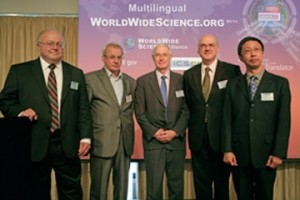Jul
[ Editor's note: This article is republished from the Deep Web Technologies Blog. It is Abe's perspective on the launch of Multilingual Federated Search in Helsinki last month. ]

Photo credit: Jakke Nikkarinen/STT Info Kuva Pictured, from left, Dr. Walter Warnick, U.S. Department of Energy Office of Scientific and Technical Information (OSTI) Director; Yuri Arskiy, All-Russian Institute of Scientific and Technical Information (VINITI) Director; Tony Hey, Microsoft Research Corporate Vice-President; Richard Boulderstone of the British Library and the WorldWideScience Alliance Chairman; and Wu Yishan, Institute of Scientific and Technical Information of China (ISTIC) Chief Engineer.
It was an honor to attend and for my company to have played a key role in the launch of multilingual WorldWideScience.org in Helsinki this past June 11th. Beginning more than three years ago, the R&D effort that ultimately resulted in the launch of our ground-breaking multilingual federated search capability involved plenty of hard work by lots of folks at Deep Web Technologies. It certainly could not have been accomplished without our invaluable partnerships with the Department of Energy Office of Scientific and Technical Information (OSTI), the WorldWideScience Alliance, and Microsoft Research.
Multilingual WorldWideScience was launched at a special ceremony culminating the International Council for Scientific and Technical Information’s (ICSTI) Annual Conference titled From Information to Innovation, which was attended by several hundred people.
Dr. Walt Warnick, Director of OSTI, gave the keynote presentation at the launch. As the driving force behind the creation of Science.gov and WorldWideScience.org, Dr. Warnick is someone with whom I have had the pleasure of working closely in the past decade, and he has continually pushed my company to advance to the next level in state-of-the-art Federated Search.
Dr. Warnick started his presentation with a quote from Sir Isaac Newton (written on Feb 15, 1676 to fellow British Researcher Robert Hooke):
“If I have seen further it is only by standing on the shoulders of giants.”
Presenting his vision of accelerating access to worldwide scientific information in order to advance scientific discovery, Dr. Warnick talked about the significant role that multilingual search can play in providing both non-English speakers translated access to research in languages other than their own and English speakers with access to the ever-increasing body of non-English scientific content.
After Dr. Warnick’s opening remarks, I had the opportunity to demo and explain how multilingual WorldWideScience works to the Conference attendees. Rather than go into detail about my demonstration, I’d like to point you to a wonderful review of multilingual WorldWideScience written by Kristin Whitman – Conduct a global literature search in seconds!
Next up was Richard Boulderstone, Chairman of the WorldWideScience Alliance and Director of eStrategy at the British Library. He spoke on the growth and significance of WorldWideScience:
“Since its launch in 2007 WorldWideScience.org has grown at an absolutely phenomenal rate, providing researchers with easy access to the publicly funded research output of 65 different countries from around the world. Fast becoming a key resource for researchers around the world, these new search and translation tools are absolutely essential to opening up research and enabling the global scientific community to share knowledge in the pursuit of progress.”
Tony Hey, Corporate Vice-President of External Research for Microsoft, next talked about the significance of Microsoft’s partnership with the WorldWideScience.org Alliance:
“The launch of multilingual WorldWideScience.org adds yet another resource that we can all leverage in support of collaborative relationships. Those relationships, in turn, expedite our ability to drive research that has the power to improve lives around the world. All of us at Microsoft Research look forward to more meaningful contributions to multilingual WorldWideScience.org to make the world’s scientific and technical information globally accessible. It has been an honor to be involved in this groundbreaking project.”
Following Tony Hey, Wu Yishan, Chief Engineer of the Institute of Scientific and Technical Information of China (ISTIC), addressed the audience and commented on the volume of scientific literature being published in Chinese and the growing need for multilingual searching:
“In 2008, while Chinese scholars published 110,000 papers on international journals recorded by SCI, they also published 470,000 papers on domestic Chinese journals. Without accessing these 470,000 papers, it is impossible to obtain a realistic feeling about the thrust of scientific and technological advancement in China. Therefore, the need for mutual translation between English and Chinese and for cross-language retrieval is increasingly urgent.”
The final remarks at this event were made by Yuri Arskiy, Director of the All-Russian Institute of Scientific and Technical Information, who spoke through a translator. The unavailability of Russian scientific research in English was a major impetus for the development of multilingual WorldWideScience. Dr. Arskiy addressed the many challenges in searching multiple databases, such as different specifications and software platforms and various classification systems across scientific disciplines. WorldWideScience.org’s federated search technologies overcomes these challenges and will make Russian science results more accessible than ever before.
Finally, Wu Yishan returned to the stage to announce that ISTICI will be hosting the next ICSTI Annual Conference in Beijing in June 2011. If I’m going to have a reason to attend the ICSTI Conference in Beijing next year, my team at DWT, in collaboration with our partners at OSTI and the WorldWideScience Alliance, better get busy planning and implementing the next round of enhancements to WorldWideScience.
If you enjoyed this post, make sure you subscribe to the RSS feed!
Tags: federated search


3 Responses so far to "Breaking Down the Language Barriers"
July 2nd, 2010 at 3:30 pm
Well done to DeepWeb! This is a nice smooth implementation, and is an important integration of different services to make a very publicly obvious step forward in searching.
July 2nd, 2010 at 3:50 pm
Thanks, Peter.
July 3rd, 2010 at 2:54 pm
Peter,
Thank you for the very nice comment that you just left. I appreciate it.
Abe